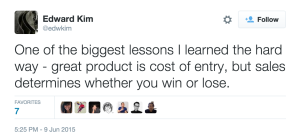The founders at SimpleReach knew they were on to something. Everything seemed to be in place.
Great product, great team, great market.
There was just one problem.
“Like most B2B companies we just took the approach of ‘build it and they will come’. But that’s just not the case,” said Eric Lubow, CTO and Co-Founder at SimpleReach.
Or as their CEO Edward Kim put it on Twitter: “One of the biggest lessons I learned the hard way – great product is cost of entry, but sales determines whether you win or lose.”

SimpleReach launched in 2010 and helps publishers track their content online and maximize its value. Clients are connected with a comprehensive performance dashboard for all of their content across several sites and social media channels.
Not only does SimpleReach tell clients how content is performing on websites and social, they also have patented technology to predict how content will perform in the future. High profile clients like The New York Times and Forbes count on SimpleReach to measure their native ad programs.
It’s a killer product that was almost stopped in its tracks by something that kills a lot of entrepreneurial dreams: sales. Because the New York Times and Forbes don’t just come knocking on your door.
The company’s co-founders — Lubow, Kim and Principal Architect Russ Bradberry — had tons of tech and product experience, but sales was mostly new territory.
Getting out of the product’s way

In their early sales pitch meetings, the founders got themselves into a problem common for many high tech B2B companies: deeply explaining the tech, rather than telling the customer how it’s going to help them.
“I think that’s a general sales mistake,” Lubow said. “You’re not putting yourself in their shoes.”
What does the client care about: “How do we use your product to drive our revenue.”
These meetings were also giving the founders signals that the product was more than satisfying for the clients, despite the founders’ perfectionist tendencies telling them to keep improving on it.
“We were constantly finding ourselves pitching to people and the clients would be like ‘OK, just tell us what it costs,’” Lubow said.
That was the key: whenever a client is giving you the ‘just tell me how much and where to sign’ talk, it’s a signal your product is great. Time to focus your energy now to getting it out to people, rather than tinkering with it to the ideal vision in your head.
“We were comparing ourselves with our perfectionists metrics,” Lubow said. “Sometimes the ‘we can do better’ is actually the problem.”
By sitting down with clients and hearing feedback, they got valuable data on what to focus on. It was time to get out of the product’s way and start selling. It was a valuable lesson. Not that it’s a lesson to stop building and improving on the product — you always do that — but it’s a lesson about knowing when to build up more sales muscle.
And that’s exactly what SimpleReach did.
Consultive sales
So how do tech- and product-focused founders with no formal sales training go about pitching some of the highest-profile publishers in the world?
“Consultive sales, that’s the key right there,” Lubow said.
It’s an approach that focuses more on the client’s needs and the client-seller interaction. It’s less “here’s our product, buy it” and more “what’s your challenge? OK here’s how we can help.”
The SimpleReach founders were doing a lot of listening in these pitch meetings — what the client desires, what their challenges are, what would help them. This meant SimpleReach could then offer something that solves a very specific problem for the client, rather than pressuring them with a product the client doesn’t understand and will have to figure out on their own.
“It’s not a hard sell,” Lubow said. “It’s not: hey here’s the deadline here’s the price.’ It’s different than that.”
But here’s the trick to consultive sales: You have to have a great product. If you’re selling snake oil — or lemon used cars — go ahead and do the hard sell. Likewise, if you’re ever on the receiving end of a hyper-aggressive sales pitch, time to be extra critical of the product being sold.
If you have a great product and sell it with consultive sales, people will say the product “sells itself.” But that’s a cliche and untrue. Even great products like SimpleReach need people doing sales. The difference is, the “selling” isn’t aggressive, it’s a method that puts the customer first, then the product, with the sales team helping out in the background. It might seem different than how lot of other companies do sales.
But if your product is great, it works.
P.S. If you liked this article, you should subscribe to our newsletter. We’ll email you a daily blog post with actionable and unconventional advice on how to work better.

